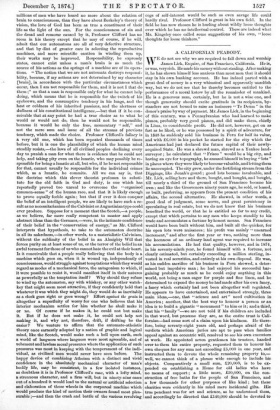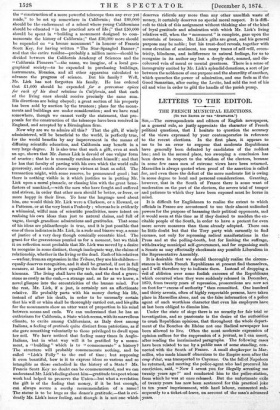A CALIFORNIAN PEABODY.
WE do not see why we are required to fall down and worship James Lick, Esquire, of San Francisco, California. He is, or was, very rich. He matle his money without stealing. After making it, he has shown himself less anxious than most men that it should stay in his own banking account. He has indeed parted with a great deal of money in a very whimaies1 and apparently unselfish way, but we do not see that he thereby becomes entitled to the performance of a moral kotow by all the remainder of mankind He is a generous man, certainly, but he is not a wise one, and though generosity should excite gratitude in its recipients, by- standers are not bound to raise an insincere " Te Deum " in the donor's praise byway of payment. Mr. James Lick, in the beginning of this century, was a Pennsylvanian who had learned to make pianos, probably very good pianos, and did make them, chiefly in Lima, to considerable profit. He did not, however, get on as fast as he liked, or he was possessed by a spirit of adventure, for in 1848 he suddenly sold his business in Peru for half its value, and with 16,000 in his pocket he started for the city which the Americans had just declared the future capital of their newly- acquired State. He was a shrewd man, shrewd as a Yankee land- surveyor ; he calculated that Frisco " would be a big city, and having an eye for topography, he amused himself in buying " lots " in places where they were likely to become valuable, and letting them lie unoccupied. The city grew, under the fertilising stream from the Diggings, like Jonah's gourd ; good lots became invaluable, and Mr. Lick, selling here and there, bought, and bought, and bought, till nearly a third of the ground of San Francisco became his own ; and like the Grosvenors ninety years ago, he sold, or leased, or built, preferring, as appears from the present condition of his affairs, the second alternative. He showed, in other words, a good deal of judgment, some nerve, and great persistency in speculating in real estate, but we do not know that his business benefited the world, or that he is entitled so far to any credit, except that which pertains to any man who keeps steadily to his trade and accumulates a fortune by honest means. San Francisco would have been built without him, and built all the quicker, for his open lots were nuisances ; his profit was mainly "unearned increment," and after the first year or two, nothing more than the keenness of an ordinary land agent was required to increase his accumulations. He had that quality, however, and in 1874, in his seventy-ninth year, he found himself with a fortune, not clearly estimated, but certainly exceeding a million sterling, in- vested in real securities, and entirely at his own disposal. He was, as his sudden sacrifice of his business in Peru showed, a deter- mined but impulsive man ; he had enjoyed his successful bar- gaining probably as much as he could enjoy anything in this world, not being a man eager for purple and fine linen, and he determined to expend the money he had made after his own fancy, a fancy which certainly had not been altogether well regulated. He appears to have entertained, and entertained strongly, three main ideas,—one, that "science and art" need cultivation in America ; another, that the best way to honour a person or an idea is to build a gigantic " monument " to him or it; and a third, that his "family "—we are not told if his children are included in that word, but presume they are, as the entire trust is Cali- fornian—had some sort of a claim upon his kindness. He there- fore, being seventy-eight years old, and perhaps afraid of the verdicts which American juries are apt to pass when families appeal against an eccentric will, resolved to see his own executors at work. He appointed seven gentlemen his trustees, handed over to them his entire property, requested them to honour his own cheques for any sum not exceeding £5,000 in one year, and instructed them to devote the whole remaining property to,— well, we cannot think of a phrase wide enough to include his objects. Comparatively a small sum, £20,000, is to be ex- pended on establishing a Home for old ladies who have no means of support ; a little more, £80,000, on the con- struction of free baths for the people of San Francisco, and a few thousands for other purposes of like kind ; but these charities were evidently in his mind mere incidental gifts. His true penchant was for art and science, as he understood them, and accordingly he directed that £140,000 should be devoted to the " construction of a more powerful telescope than any ever yet made," to be set up somewhere in California ; that /60,000 should be the endowment of a school where young Californians should be educated "in the practical arts of life ;" that £50,000 should be spent in "building a monument designed to com- memorate the history of California ;" that /30,000 more should be expended on "a bronze monument" in honour of Francis Scott Key, for having written "The Star-Spangled Banner ;" and that the entire residue—probably a million more—should be divided between the California Academy of Sciences and the "California Pioneers "—the name, we imagine, of a local geo- graphical society—to be expended in purchasing buildings, instruments, libraries, and all other apparatus calculated to advance the progress of science. But his family ? Well, , Mr. Lick has not forgotten his family. He has ordered that 11,000 should be expended for a gravestone apiece for each of his dead relations in California, and that each of the living ones should receive precisely the same sum. His directions are being obeyed; a great section of his property has been sold by auction by the trustees ; plans for the monu- ments and buildings are under consideration ; and we have read somewhere, though we cannot verify the statement, that pro- posals for the -construction of the telescope have been received in England, and accepted by a Birmingham firm.
Now why are we to admire all this? That the gift, if wisely administered, will be beneficial to the world, is perfectly true, for the world benefits by any improvement in the means of diffusing scientific education, and California may benefit in a very large degree. It is also true that such a gift, even at such an age, shows that Mr. James Lick is devoid of one vulgar form of avarice ; that he is unusually careless about himself; and that he has that faculty of parting with his own which the world calls generosity, and extols above many virtues at least as solid. The transaction might, with some reserve, be pronounced good ; but there is nothing visible in it which justifies us in putting Mr. Lick upon a moral pinnacle, or classing him with the great bene- factors of mankind,—with the men who have fought and suffered and striven, in order that other men should be better, or freer, or more happy in their lives. To hear the language used about him, one would think Mr. Lick were a Clarkson, or a Howard, or a Patteson, or at the very least a Peabody ; whereas he is evidently a whimsical, wilful man of scientific proclivities, more intent on realising his own ideas than just to natural claims, and full of vague, though grandiose admirations and gratitudes. That some of his ideas are philanthropic is true, and it is just possible that one of them indicates in Mr. Lick, in a rude and bizarre way, a sense of justice of a very deep though comically eccentric kind. The grant for the gravestones puzzled us for a moment, but we think it on reflection most probable that Mr. Lick was moved by a desire to recognise in some distinct, though inadequate -way, the claims of relationship, whether in the living or the dead. Each of his relatives —we fear, from an expression in the Tribune, they are his children— equally deserves recognition, and it shall be granted, if not in full measure, at least in perfect equality to the dead as to the living kinsman. The living shall have the cash, and the dead a grave- stone as costly as the cash,—a strange and, as far as we know, a novel glimpse into the eccentricities of the human mind. For the rest, Mr. Lick, if a just, is certainly not an affectionate relative. He probably parts with his money during his life, instead of after his death, in order to be unusually certain that his will or whim shall be thoroughly carried out, and his gifts for the monuments show an utter want of proportion in his mind between means and ends. We can understand that he has an enthusiasm for California, a State which seems, with its marvellous climate, to excite among Californians, as Italy does among Italians, a feeling of gratitude quite distinct from patriotism, as if she gave something voluntarily to those privileged to dwell upon her soil. We have noticed that feeling many times in Anglo- Italians, but in what way will it be gratified by a monu- ment, a " building " which is to "commemorate" a history? The structure will probably commemorate nothing, and be called "Lick's Folly" to the end of time ; but supposing it even beautiful, how is it to express ideas so various and so intangible as those embodied in the history of a State ? Mr. Francis Scott Key no doubt can be commemorated, and we can understand Mr. Lick's feeling about him—gratitude to apoet whose work had helped to preserve the Union—but what a revelation the gift is of the feeling that money, if it be but enough, can always secure a worthy recommendation of a name ! The statue is to be huge as the donor's gratitude,—that is evi- dently Mr. Lick's inner feeling, and though it is not one which deserves ridicule any more than any other unselfish waste of money, it certainly deserves no special moral respect. It is diffi- cult to think of this assignment without thinking also of the kind of loyal gratitude and admiration with which Mr. Lick's living relatives will, when the " monument " is complete, gaze upon the mountain of bronze. Mr. Lick's gifts are great, and his general purpose may be noble ; but his trust-deed reveals, together with some elevation of sentiment, too many traces of self-will, eccen- tricity, blindness, and indifference to natural feelings, for us to recognise in its author any but a deeply shot, seamed, and dis- coloured vein of moral or mental greatness. There is a sense of incongruity excited by Mr. Lick's splendid donations, a sort of jar between the nobleness of one purpose and the absurdity of another, which quenches the power of admiration, and one feels as if the Good Samaritan, after curing the Levite, had sold the rest of his oil and wine in order to gild the handle of the parish pump.



































 Previous page
Previous page